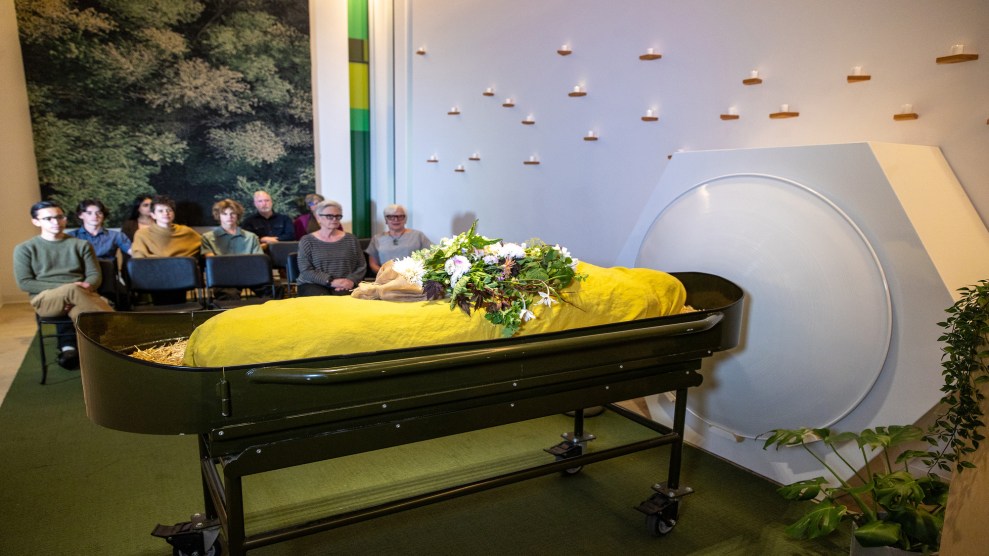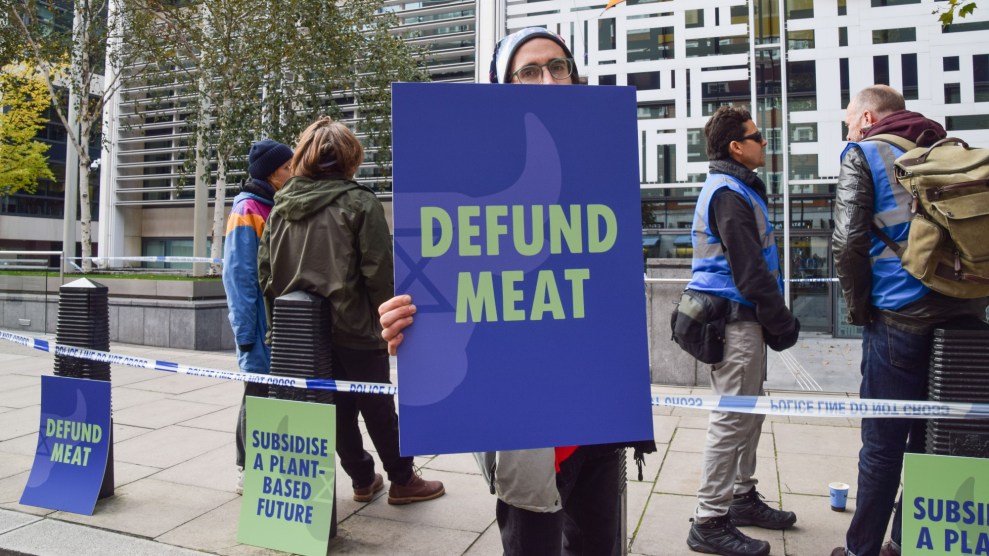
Guests sit in the gathering space looking at a shrouded mannequin in front of the threshold vessel at Recompose, a green funeral home specializing in human composting.Mat Hayward/Getty for Recompose
This story was originally published by the Guardian and is reproduced here as part of the Climate Desk collaboration.
Americans are looking for greener ways to die, and a new wave of deathcare startups are rising to the occasion.
After death, bodies are typically handled in one of two ways: embalmed and buried in a casket, or incinerated and turned into ashes. But both of these options have contributed to the environmental crisis—with fossil fuel-intensive cremation emitting chemicals such as carbon monoxide into the air, and burials taking up large swathes of land.
As interest in alternatives rises, startups aiming to disrupt these practices are gaining steam. New York in January became the sixth state in the US to legalize human composting, also known as “natural organic reduction,” which uses heat and oxygen to speed up the microbial process that converts bodies into soil.
The growth in demand comes in part due to Covid-19, experts say. The pandemic brought death to the forefront of the public consciousness and exposed concerns about its environmental destruction, as places like Los Angeles had to suspend air pollution rules to allow an influx of bodies to be processed.
Human composters are pitching themselves as part of the solution—and trying to dismantle the funeral industry in the process. The potential to alter an age-old practice has brought together former Silicon Valley types, celebrity investors and mission-driven entrepreneurs as interested in lofty green goals as they are in changing our relationship to death.
Providers say they are seeing unprecedented demand. The human composting startup Return Home has seen 20 people from California, where human composting is not yet legal, transport loved ones to the company facilities in Washington state—including five who drove with bodies in tow.
“The fact that we are now seeing so many Californians flocking to Return Home in order to pre-purchase services for themselves and their loved ones is proof-positive that [our technology] is the future of funeral services,” said Micah Truman, the company’s CEO and founder.
Founders paint a picture of an industry that is both collegial and competitive, where entrepreneurs connect at meetups and through group chats but often find themselves looking over their shoulders for people entering the industry with less altruistic views. This is especially true as old guards of the funeral industry seek to cash in on the new trend, Truman said.
“It’s interesting because to create disruption, we are going to have to have outsiders coming in,” he said. “Because everyone in the funeral industry is so invested in existing technologies, you need outsiders to help with thinking outside the box—no pun intended.”
Natural organic reduction is a relatively new process, recognized throughout the industry as having been pioneered by a woman named Katrina Spade. In her graduate thesis in 2013, Spade investigated methods farmers had been using to compost animals and found they could be applied to human bodies. When remains are placed in a container with natural materials like straw and wood chips, the microbial process that converts bodies into soil can be accelerated. Composting a human currently takes eight to 12 weeks, and is estimated to use just one-eighth the energy required for cremation.
In the ensuing years, Spade worked with lobbyists, lawmakers and investors to legalize natural organic reduction in Washington in 2019. By December 2020, her company Recompose had made it available to consumers for $7,000—in line with the median cost of cremation, at $6,971, and the median cost of a funeral with burial, at $7,848, not including cemetery plot costs, which can run upwards of several thousand dollars.
In the years since, at least three companies have sprung up in Washington alone, some of which have secured millions in funding from venture capital firms. And with more states catching on, entrepreneurs say the industry is livelier than ever.
At least six states have legalized the process so far, and California, the most populous US state, will allow human composting in 2027 after a law passed last year goes into effect, opening up the potential for millions of new customers.
“In Washington, where human composting has been legal for some time, the industry is concentrated and hyper-competitive,” Truman said. “But I’m sure everyone is going to be doing pushups and getting ready to go to California as soon as it opens.”
The commercialization of alternative deathcare is already creating tension in an industry built on a fraught product. It’s difficult to get people to talk about death, much less invest in it. This has left deathcare entrepreneurs and advocates for greener death grappling to balance altruistic goals with the demands of startup culture, according to Caitlin Doughty, a mortician and author of several books about death and the funeral industry.
“There is a newer disconnect between the fundamental idea of ritual around death in human composting versus a bizarre appeal to Silicon Valley that is emerging,” she said. “It is a fascinating development.”
With the traditional funeral market worth $20 billion, it is no surprise new technologies have piqued the interest of tech investors. A 2019 survey from the funeral directors’ association found that nearly 52 percent of Americans expressed interest in green-burial options, and experts have estimated that the emerging market opened by legalization efforts in Massachusetts, Illinois, California, and New York could create a market value in the $1 billion range.
There is also a growing market in Gen Z and millennials, who have been called the “death positive” generation—more willing to discuss after-life plans at younger ages and try green alternatives. Startups are rising to the occasion with social media outreach: Return Home has more than 617,000 followers on TikTok, where its employees answer questions like “what happens to hip replacements in the human composting process?” and “how does it smell during the process?”
Human composting is not the only alternative deathcare option that is seeing increased interest. Others include aquamation, a process legal in 28 states by which the body is turned into liquid and then powder. Green burial, in which bodies are interred without embalming or a casket and allowed to decompose naturally over time, is legal in almost all states, but laws vary as to where the body can be buried.
But of all the alternative options, human composting seems to have gotten the most attention, said Doughty. “I do see the composting space as being uniquely competitive in a way that I haven’t seen with [other processes] like aquamation or even cremation,” she said. “It seems uniquely positioned at a nexus of climate change policy and new technology that appeals to the Silicon Valley ethos.”
The environmental benefits of alternative deathcare have become a large selling point for companies as green investments trend upwards. Transcend, a New York-based green burial startup that promises to turn human bodies into trees after death, highlights its goal of mass reforestation and eco-friendly burial in its advertising, stating on its website: “Every Tree Burial creates a healthier foundation for all life on Earth.”
Its founder and CEO, Matthew Kochmann, has a Silicon Valley background, counting himself as one of the first employees at Uber. He came to the deathcare industry after meditating on the spiritual nature of burial options, he says.
“I was thinking about how I personally would like to become a tree after death, and I realized that there weren’t any options out there to make that happen—I’d have to do it myself,” he said. “I am a huge advocate of helping heal humanity’s relationship and fear around mortality.”
Through Transcend’s process, the body is buried in organic biodegradable flax linen along with a unique blend of fungi-enriched soil, and a young tree is planted in the ground above it. The company says the mushrooms then “work their magic” to ensure “a direct connection between the nutrient-rich body and the tree’s root system so that the body can literally become the tree”.
The company has piqued the interest of investors and celebrities, with Darren Aronofsky, director of Black Swan and Requiem for a Dream, counting himself among the company’s advisers. Still, fundraising hadn’t always been easy, Kochmann said, adding that some investors had told him: “We don’t invest in taboo areas like pornography or death.”
“Putting death on par with pornography just shows that there’s still a lot of work to do in our culture and our society to get people more comfortable with it,” he said.
Recompose, the original human composting startup, has raised nearly $18 million—none of which, its founder is quick to point out, came from traditional venture capital funds, but instead from accredited “values-aligned investors,” Spade said—investors who “are first and foremost investing for the mission and the vision” of Recompose.
Spade said the company had prioritized fundraising models that allow it to stay true to its roots as an advocacy group while still creating sustainable funding. It has also launched a “community fund” to help subsidize its services for clients who cannot afford to pay full price.
The company has worked directly with legislators to pass laws that allow for human composting while creating a framework that supports strong ethics in the burgeoning industry.
“We want to be sure that any kind of human composting operator that’s working with grieving families is doing so within the utmost ethical practices,” she said. “It is not only about how to decompose, operate, and care for our clients—but also, how can we support an industry that always has the most ethical, rigorous operations?”
Spade said although her company had been the first to pioneer human composting, she was “thrilled” to see the movement grow. And although the new frontier of deathcare is getting increasingly crowded in some places, those involved say there is an environment of camaraderie and support as they work towards a common goal: taking down the monopoly that the traditional funeral industry has on death.
“This is a community that has to prioritize solidarity,” said Kochmann. “You are fighting for legislation, you are fighting regulatory battles, and you are fighting an uphill consumer battle because people don’t want to think about death.”

















